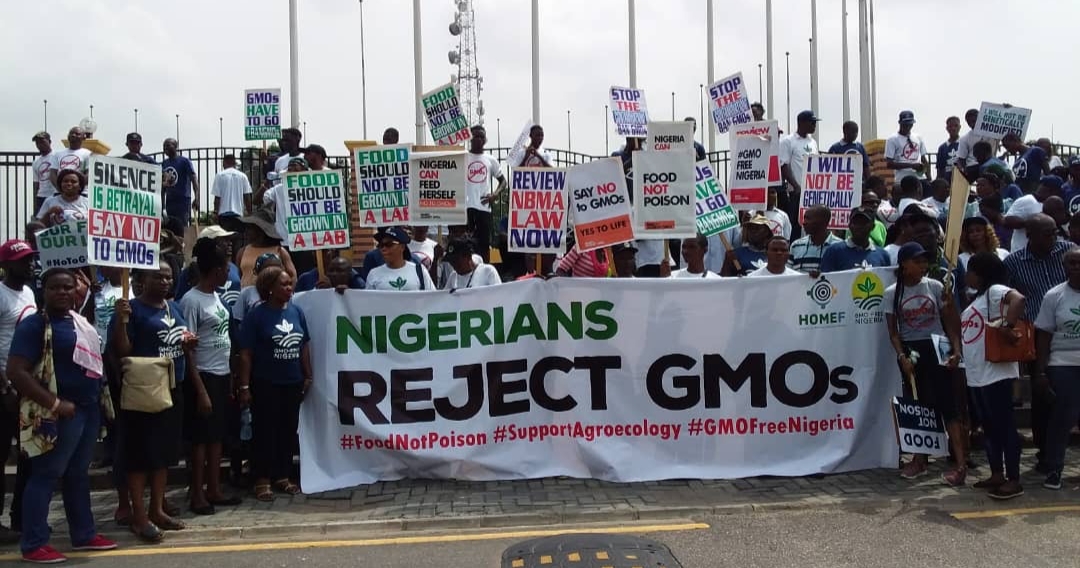
By Edu Abade
Nigerian farmers, researchers, civil society organizations (CSOs), faith-based organizations, academics, women and youth have demanded an outright ban on Genetically Modified Organisms (GMOs) crops and preservation of the country’s indigenous seeds and food system.
They made the demand in a communiqué at the end of National Conference on GMOs and Biosafety in Nigeria organized by the Health of Mother Earth Foundation (HOMEF) in Abuja with the theme: Beyond the Propaganda: Unveiling the Truth About GMOs.
In a post-conference document made available to journalists by Media and Communication Lead of HOMEF, ‘Kome Odhomor, the participants at the National Conference demanded that provisions in the National Biosafety Management Agency (NBMA) should be urgently reviewed to address existing loopholes including the conflicting composition of the NBMA Board, absence of provision on strict liability, poor attention to the precautionary principle, the discretionary provision on risk assessment and power to receive gifts, among others.
“The NBMA should produce for peer review, results of risk assessments conducted prior to the approval and commercial release of GMOs in Nigeria.
“The Nigerian Government should ensure improved support for small holder farmers who are actually feeding the country.
This should include reviving the extension service system across all local governments; increased provision of infrastructure (to reduce post harvest losses); addressing insecurity (to allow farmers return to farms); ensuring
better access to credit and to land; and proper remediation of oil polluted soils (in the Niger Delta and other mining impacted communities,” the communiqué reads.
Other demands include that the House of Representatives Committees on Agriculture and Services, Health and the Environment should ensure an independent and long-term research on GMOs and biosafety as was announced in May 2024.
The Federal Ministry of Agriculture and Food Security should invest in and promote the adoption of an Agroecological system of farming which is proven to assure increased food productivity, diversify income for farmers, recover degraded soils, increase biological and nutritional diversity, mitigate climate change and its impact and ensure food sovereignty for Nigeria.
Also the Federal Ministry of Agriculture and Food security should promote the set up of markets for organic and agroecological food products in Nigeria.
Speaking, Director of HOMEF, Dr. Nnimmo Bassey argued that in almost 30 years since the introduction of GMOs, they have not resolved the problem of hunger in countries where they have been deployed or in the world, insisting that there is no evidence of a country which has eradicated food insecurity with GMOs.
He maintained that GMOs are mostly driven by greed and profit maximization rather than the need to address hunger or food insecurity. Currently, this technology is dominated by a small number of corporations.
Bassey revealed that four companies namely: Bayer (merged with Monsanto), Corteva, ChemChina and Limagrain control 60 percent of the global seed supply, adding the companies engage in the development and patenting of genetically modified (GM) seeds, also known as genetically modified organisms (GMOs)).
“There is significant linkage of consumption of GMOs with several health and environmental implications including cancers, mental health disorders, immune disorders as well as loss of nutritional and biological diversity.
“The Bt Crops have been linked to soil degradation through the destruction of soil microbiota leading to reduced productivity and yields. GMOs can be used as biological weapons due to the ability to alter genetic material of species and to drive extinction.
“Industrial agriculture has led to the treatment of food as a mere commodity and corporate control of seeds – production and sales, food packaging, agricultural machinery and agrochemicals in the world today,” the communiqué added.
The participants also stated that the question of safety of GMOs in Nigeria remains unanswered, adding that so far, there is no evidence of independent, long-term risk assessment conducted by the NBMA which is saddled with the responsibility.
“There is the need to critically consider the underlying causes of food insecurity in Nigeria caused by bad governance, insecurity, climate change, poor extension service, lack of storage and processing infrastructure, soil degradation, poverty and inequalities, among others, which directly affect agricultural productivity. GMOs are not the solution to the challenges”, the communiqué concluded.











